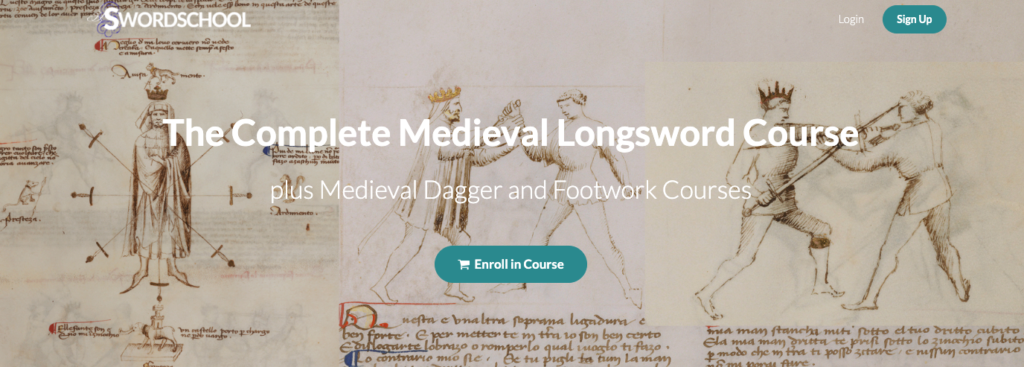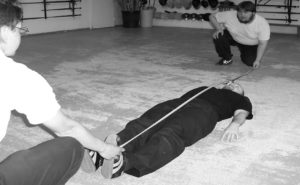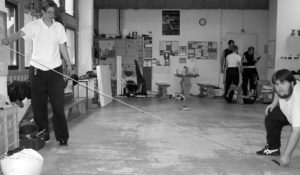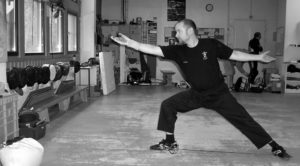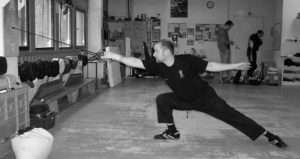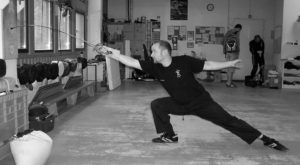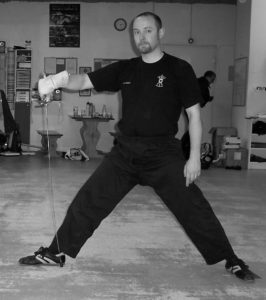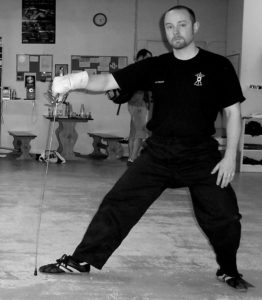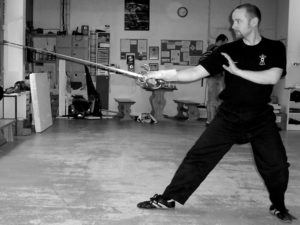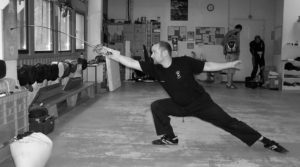
We have to move.
If a shark stops swimming it dies- and if we stop moving it doesn’t take long before the problems mount up. We can get away with it for a bit longer than sharks, but sooner or later the bill comes due.
Swords are cool- cool enough to get people who have never even considered taking up a physical activity for fun before to actually start training. There are huge long-term health benefits to regular exercise, pretty much regardless of what that exercise is.
But no historical martial art is optimised for long-term health. It can’t be: the immediate needs of surviving the sword fight are more important than the possibility of eventually developing knee problems or back pain.
The specific ranges of motion required by a given sword fighting style may be quite extreme (such as in a rapier lunge), but they will never be comprehensive: in no style ever do you do a gentle forward stretch with a curved back, or indeed arch as far back as you can sensibly go, or even just touch your heel to your arse to stretch your quads. Those ranges of motion are good for us, but not included in the martial arts themselves.
I intend to be swinging swords around in various historical manners for decades to come, and I’m already 48. It is therefore necessary to have a physical practice aimed at filling in the gaps, and keeping this carcase in sufficiently good shape that I can be whacking my friends over the head with blades when I’m 90.
I also need to be able to teach my students how to do the same thing- and there’s the rub. Every body is different, and so every training regime should be tailored to the individual. And every body changes over time- ideally getting fitter and stronger, but at least not deteriorating any faster than we can help. Which means that you can’t just learn a routine now and stick with it forever, if you want the best results for the least effort.
I cover the fundamentals of how to train in my book The Principles and Practices of Solo Training and we follow those principles in class. But the book doesn’t include much in the way of specific exercises, because it was intended to lay out the principles, not cover every possible practice. The book will tell you how to train, and how to prioritise your training time, but it doesn’t tell you whether you should be doing push-ups or lunges right now.
To create our practice we need a comprehensive suite of exercises to select from, and the skill to choose from that suite wisely. We also need to know what it is we are training for at any given time. Here are some possibilities:
- Pre-hab. Long-term injury prevention through movement, range of motion work, breathing and strength training. This is perhaps 50% of all my training.
- Conditioning. Increasing our strength, speed, range of motion, or other attribute, through exercises of various kinds. This is about 40% of my training.
- Warming up and warming down: preparing for a specific kind of movement (such as strength training, rapier footwork practice, a longsword tournament bout, or any other high-intensity activity), and promoting recovery afterwards. You may need to warm up for pre-hab or conditioning, of course.
A specific exercise such as an overhead press, or a push-up, or a hamstring stretch can be used in all three of these situations- but how we use it will differ.
Structuring a Training Session
I run a Trainalong training session over Zoom three mornings a week, and usually structure them like so:
Section One: warm-up.
1. Running a diagnostic. Gentle joint rotations from toes to fingers, with a few squats and some gentle range of motion work. This tells me whether I need to pay attention to a specific area, and whether the session I had in mind is likely to be a good idea.
2. Full range of motion of the spine
3. Shoulder stability work
Section Two: conditioning
Focusing on my own areas of weakness, especially forearms.
1. Some kind of strength work, often bodyweight or kettlebells
2. Leg stability work such as seven-way legs, or kicking practice
3. Forearm conditioning
Section Three: skills practice
1. Some kind of footwork
2. Some kind of weapon handling (though often disguised as stick conditioning drills or bladebell exercises). These are often combined with the footwork, of course.
3. And/or breathing training, such as the Breathing Form.
Section Four: recovery
1. Some breathing
2. Some stretching, especially of the legs
3. Forearm and leg massage (which you may be familiar with from my free Human Maintenance course)
4. A very short meditation
5. Deliberately finishing.
Seeing it broken down like that doesn’t reflect the experience of it. The sections will blend into each other, and overlap- we may intersperse arm weights with footwork, for example. I very often include planks and other “core” work in with the spine range of motion or hip/knee stability exercises. The full-body survey at the beginning and the warm-down ending sequence tend to be quite consistent. I also adjust the training depending on my own health and current needs, and incorporating any requests that the students bring up on the day.
Some of the weird stuff we do sometimes includes jaw relaxation exercises, toe yoga, and finger dexterity drills.
I’ve attached a fairly comprehensive list of the exercises we do as a pdf below. Be warned, it’s just a list, and “Granny’s Scarf” may not mean anything to you just yet. But it should give you an idea of what I mean by ‘comprehensive’.
What about the skill to choose wisely from the list?
That is primarily a matter of mindset. If you go into a session with the intention of finding out what your body needs, and then carefully doing that, you will probably avoid injury, and certainly become better at listening to your body. As every body is different, I encourage my students to adapt or adjust what we’re doing to suit them. I may be recovering from an injury or illness, and be doing some gentle recovery work when we’re twenty minutes in- you may need to be doing push-ups or kettlebells while I’m resting. While the class is doing Turkish Get-ups, a student with a knee problem may be doing her prescribed rehab exercises.
Levels of Difficulty
Every exercise can be done at various levels of difficulty. Let’s take the humble push-up for example:
1. Knees on the ground, go down an inch.
2. Knees on the ground, work up to going all the way down.
3. One leg extended
4. Full push-up position, hold
5. Working up to a full basic pushup
6. Different hand positions- three knuckle, two knuckle, one knuckle, prima, seconda, quarta, hands wide, long, staggered, etc.
7. Going for more repetitions
8. Slow push-ups (eg 30 seconds down, 30 seconds up)
9. Plyo push-ups, eg clap push-ups, or push-up-twisting-squat-jump-burpees
10. One-armed push-ups
11. One-armed push-ups with different hand positions
12. Plyo one-armed push-ups
And so on.
I may be working on 6, while one student is on 2, and another on 11. Literally every exercise has easier and harder versions, so can be adapted to anyone’s current level.
Join Us!
It is very relaxing to just show up and do as you are told for a while, and indeed having a personal trainer who knows you well and pushes you as needed would be great. But as martial artists, more is expected of us. We can’t be dependent on external forces to guide our training- we must take ownership and responsibility for our own development. And outside a one-to-one coaching session, no trainer can perfectly adapt the class to your needs. But you can.
One way to learn to do that is to come to my Trainalong sessions. You can find them in our Sword People community.
Everyone is welcome, whether you’re super-fit or not fit at all (yet). You won’t hold up the class (or be held up) because we are all moving at our own pace.
Useful resources on this topic:
You may find The Principles and Practices of Solo Training helpful.
I cover a lot of the exercises in the Solo Training course, though that course focusses primarily on weapons handling. https://swordschool.teachable.com/p/solo-training
You can have a go with a sample session here:
You can download the exercises list here: Trainalong Curriculum
You may find my conversation with biomechanist Katy Bowman: Movement Matters.
